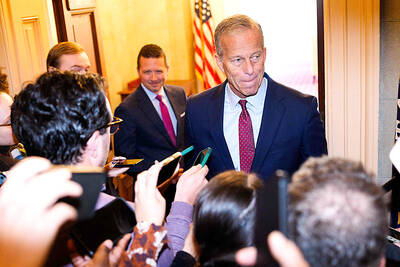Ma Xiaolin frequently wrote about current affairs on Sina Weibo, one of China’s leading microblogging sites, where he has 2 million followers, but he wrote in a post that the site called and asked him not to post original content on topics ranging from politics to economic and military issues.
“As an international affairs researcher and a columnist, it looks like I can only go the route of entertainment, food and beverage now,” the international relations professor wrote on Jan. 31.
Ma, who often posted on developments in the Middle East, is one of many popular influencers working within the constraints of China’s heavily censored Web who is finding that their space to speak is shrinking even further with the latest policy changes.
Beginning next week, the Cyberspace Administration of China (CAC) is to require bloggers and influencers to have a government-approved credential before they can publish on a wide range of subjects. Some fear that only state media and official propaganda accounts are to get permission.
While permits have been needed since at least 2017 to write about topics such as political and military affairs, enforcement has not been widespread. The new rules expand that requirement to health, economics, education and judicial matters.
“The regulators want to control the entire procedure of information production,” said Titus Chen (陳至潔), an expert on Chinese social media policy at Kaohsiung’s National Sun Yat-sen University.
The new credential requirement could restrict people from posting original content, including influencers like Ma who are not openly challenging the line of the Chinese Communist Party.
Sina Weibo CEO Wang Gaofei (王高飛), responding to Ma on the platform, said that commentary on news released by official media was permitted, but that commentators could not “release news” themselves.
The policy revision is meant “to standardize and steer public accounts and information service platforms to be more self-aware in keeping the correct direction of public opinion,” the CAC said in a posted statement.
A week after unveiling the new rules late last month, the agency held a nationwide conference on the importance of “strengthening order in online publishing.”
CAC head Zhuang Rongwen (莊榮文) said that the agency must “let our supervision and management grow teeth.”
The agency on Feb. 4 publicly announced a month-long cleanup drive targeting search engines, social media and browsers.
“It is a big deal; it’s a massive campaign,” said Xiao Qiang (蕭強), an expert on digital censorship at the University of California, Berkeley. “And these are people who didn’t write something sharp. They are intentionally not being edgy about things.”
A notice last month on Sohu, which also hosts microblogs, said that public accounts without credentials must not issue or republish current affairs news.
Banned topics include “articles and commentary on politics, economics, military affairs, and diplomatic and public affairs; taking out of context and distorting the content of the [Chinese Communist Party] and country’s history; breaking news and commentary.”
Internet giant Baidu, which also has a publishing platform, issued a similar notice.
A current affairs account on Tencent’s WeChat was last week shut down on “suspicion of providing an Internet news information service.”
Called “August Old Yu” (八月老喻), it was run by Yu Shenghong (喻聖宏), a former journalist at China Central Television.
The COVID-19 pandemic appears to have in part spurred the tightened regulations. In the early days of China’s outbreak much of the news coverage was driven by online accounts and digital-only media outlets, which circulated both news and rumors.
During the outbreak, “‘self-media’ maliciously created rumors and casually disregarded others’ privacy, severely impacting the stability and harmony of society and damaged the legal rights and interest of others,” the CAC said in a notice explaining the new policies.
Ultimately, the new rules reflect the censors’ worries, even if it is not precisely clear what they are so insecure about, Xiao said.
“In the past entire year, the control has been so tight that hardly anyone can speak about anything,” Xiao added.

James Watson — the Nobel laureate co-credited with the pivotal discovery of DNA’s double-helix structure, but whose career was later tainted by his repeated racist remarks — has died, his former lab said on Friday. He was 97. The eminent biologist died on Thursday in hospice care on Long Island in New York, announced the Cold Spring Harbor Laboratory, where he was based for much of his career. Watson became among the 20th century’s most storied scientists for his 1953 breakthrough discovery of the double helix with researcher partner Francis Crick. Along with Crick and Maurice Wilkins, he shared the

China’s Shenzhou-20 crewed spacecraft has delayed its return mission to Earth after the vessel was possibly hit by tiny bits of space debris, the country’s human spaceflight agency said yesterday, an unusual situation that could disrupt the operation of the country’s space station Tiangong. An impact analysis and risk assessment are underway, the China Manned Space Agency (CMSA) said in a statement, without providing a new schedule for the return mission, which was originally set to land in northern China yesterday. The delay highlights the danger to space travel posed by increasing amounts of debris, such as discarded launch vehicles or vessel

IMPASSE: US President Donald Trump pressed to end the filibuster in a sign that he is unlikely to compromise despite Democrat offers for a delayed healthcare vote The US government shutdown stretched into its 40th day yesterday even as senators stayed in Washington for a grueling weekend session hoping to find an end to the funding fight that has disrupted flights nationwide, threatened food assistance for millions of Americans and left federal workers without pay. The US Senate has so far shown few signs of progress over a weekend that could be crucial for the shutdown fight. Republican leaders are hoping to hold votes on a new package of bills that would reopen the government into January while also approving full-year funding for several parts of government, but

TOWERING FIGURE: To Republicans she was emblematic of the excesses of the liberal elite, but lawmakers admired her ability to corral her caucus through difficult votes Nancy Pelosi, a towering figure in US politics, a leading foe of US President Donald Trump and the first woman to serve as US House of Representatives speaker, on Thursday announced that she would step down at the next election. Admired as a master strategist with a no-nonsense leadership style that delivered for her party, the 85-year-old Democrat shepherded historic legislation through the US Congress as she navigated a bitter partisan divide. In later years, she was a fierce adversary of Trump, twice leading his impeachment and stunning Washington in 2020 when she ripped up a copy of his speech to the